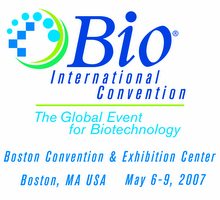What an action packed day. I live, eat and breathe in the world of seed-stage start-ups via my work with the Fitzsimons BioBusiness Incubator. Achieving a first institutional round (i.e. VC, PE or IB) financing is what we are constantly striving for, thus I found myself immersed in the finance tract for the morning, first in Creative Financing Options for Development-Stage Companies then moved into New Funding Alternatives for the Biotech Industry. Two very interesting financing strategies came on my radar, the first Development Company model courtesy of Mark Kessel at Symphony Capital and then the Special Purpose Acquisition Corp. courtesy of Robert Easton of Easton Strategy.
It was off to lunch next where I stood in perhaps the longest line of my life, people numbered in the thousands, but time passed quickly as I met and spoke with David DeLucia, CEO of Hanover, NH based ImmuRx. The wait was worth it as we had the opportunity to listen to Senator Edward Kennedy and Michael J. Fox speak.
Following lunch I had an incredible networking session at the Biozona (Arizona) pavilion with the exceedingly intelligent Angela Lutich, director of the Snell & Wilmer bioscience group. Thank you Angela for your insight and assistance! Then it was off to check in at the Colorado pavilion, a meet and greet with my fellow BIO2007 bloggers and topped off the day with an incredible networking dinner at Legal Sea Foods in Kendall Square. A great day at BIO2007 indeed and looking forward to an early start tomorrow.
Sights and Sounds:




